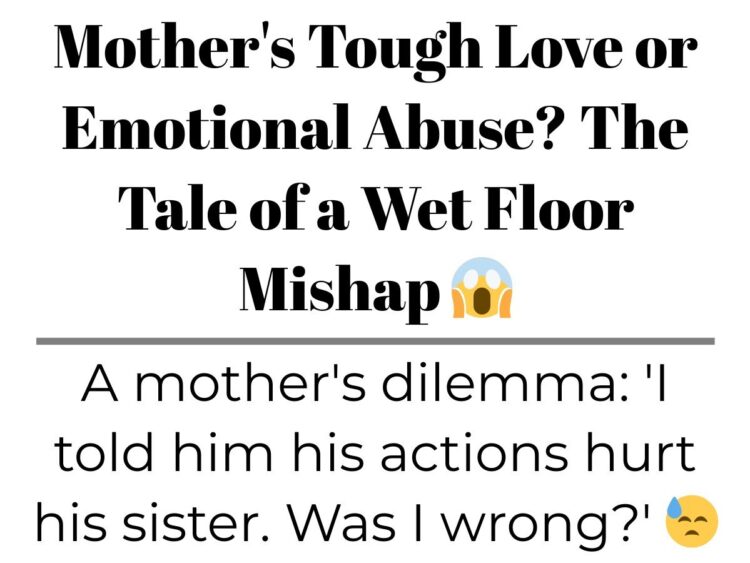Parenting is no easy task, especially when you’re trying to break the cycle of abuse from your own childhood. One mother found herself in a whirlwind of self-doubt after a seemingly harmless disciplinary action. Her 4-year-old son’s water games led to a nasty fall for his younger sister. The mother, in her attempt to teach him about consequences, told him that his sister’s injury was his fault. But when her husband suggested that her approach might be seen as emotional abuse, she was left questioning her parenting. Let’s delve into this emotionally charged tale. ️
A Mother’s Struggle

The Water Play Saga

Slippery Consequences

A Nasty Fall

Time Out and Apologies ♂️

The Lesson and the Doubt

A Husband’s Concern

A Mother’s Fear

The Big Question ❓

Navigating Blindly

Tough Love or Emotional Abuse? A Parenting Dilemma
In an attempt to teach her son about the consequences of his actions, a mother told him that his sister’s injury was his fault. But when her husband suggested this might be seen as emotional abuse, she was left questioning her parenting methods. With no good role models from their own childhoods, this couple is navigating the treacherous waters of parenting, trying their best not to repeat the mistakes of their past. Let’s see what the internet has to say about this emotionally charged situation.
“NTA. Teaching consequences and empathy is not emotional abuse. “
![Image credit: [deleted] | [deleted]](https://static.diply.com/4f0baf96-55e4-49a8-aa85-0584a09a0e2b.png)
NTA. Teaching kids consequences is important. How would husband handle?

NTA, husband needs to explain why he called it abuse.

Teaching through consequences: NTA! Tough love or emotional abuse?

NTA. Proper parenting vs emotional abuse. Communication is key
![Image credit: [deleted] | [deleted]](https://static.diply.com/8199e8e9-ded6-4748-85b7-6528704193a1.png)
Teaching consequences vs emotional abuse? Parents discuss parenting dilemmas.

Explaining consequences vs. emotional abuse: NTA’s perspective

Educator confirms mom’s tough love approach, emphasizes importance of empathy ❤️

NTA. Teaching responsibility to a 4-year-old. Husband disagrees.

NTA. Teaching kids consequences and sibling responsibility

NTA: Tough love teaches responsibility. Apology and understanding needed

You handled it fine! NTA.

NTA. Explaining actions to husband. Is it really emotional abuse?

NTA: Tough love or emotional abuse? Let’s hear your thoughts!

Teaching consequences: NTA mom shows son the slippery truth

NTA teaches son a lesson about consequences. Sibling bond strengthened

Engaging comment: NTA. Parenting done right with tough love and explanation.

Teaching consequences: NTA spills water, sister gets hurt

NTA- Firm parenting advice, not emotional abuse.

Safety first! NTA, but baby lock that bathroom door

Engaging discussion on parenting styles and child safety

NTA – A fair explanation, not emotional abuse.

Prevention is key! Child lock on faucets could help.
![Image credit: [deleted] | [deleted]](https://static.diply.com/98f0c465-b9fb-4376-b60b-d96b12d4aa2e.png)
NTA! Tough love and teaching accountability

Avoid forced hugs when apologizing to prevent future issues

Teaching kids consequences: NTA!

Enforcing boundaries with kids: NTA, but tough love needed

Teaching kids empathy through apologies – NTA wins parenting points!

Understanding a 4-year-old’s mistake and teaching empathy

Transitioning to empathy and teaching responsibility after a wet floor mishap

Teaching consequences and empathy: a tough but necessary lesson

Mother’s tough love or emotional abuse? Commenter says NTA

Engaging with a NTA comment on parenting strategies and suggestions

Teaching consequences with calm explanation

NTA, teaching kids empathy through tough love. Well done!

Not the a**hole for the wet floor mishap

NTA: Natural consequences taught a valuable lesson with empathy

NTA. Calmly handled with age appropriate punishment and explanation. Well done!

Teaching consequences or emotional abuse? A wet floor lesson
![Image credit: [deleted] | [deleted]](https://static.diply.com/0105dd17-5c70-423c-8d13-d2a206de1276.png)
Teaching responsibility: NTA shows natural consequences for actions

Mom’s warning ignored, sister got hurt. Tough love justified.

NTA – Learn the concaquinces of your actions!

NTA: Tough love teaches kids consequences. No shared brain cells
![Image credit: [deleted] | [deleted]](https://static.diply.com/64fe7f79-68ea-41cd-b861-b0cda19fa42a.png)
Commenter defends against accusation of emotional abuse with evidence.

NTA, but words/phrasing matter. Encouraging apologies without blaming.

Son’s fault, accountability. Emotional abuse if not his fault.

Modeling empathy and teaching real remorse vs. forcing fake apologies

Setting boundaries vs. emotional abuse: Where do we draw the line?

Creative solution to stop child from playing with water!

NTA. Tough love with a wet floor mishap. Well handled!

NTA. Tough love teaches safety and independence. Communication is key.

NTA. Teaching kids consequences is not emotional abuse!

Teaching consequences ≠ emotional abuse. Don’t overuse the term ‘abuse’.

NTA for disciplining son; husband is TA for making you feel bad

NTA. Teaching kids to learn and grow from their mistakes

NTA. Firm but fair parenting, not emotional abuse.

Teaching with love and calmness

NAH, parents supporting each other through the ups and downs

NTA: Mom’s tough love is actually breaking the cycle of abuse!

Traumatizing a 4-year-old? A more gentle approach is needed.

NTA. Firm parenting with a goal to improve for our kids

NTA. Teaching consequences, seeking reassurance, and empathy for abuse survivors

Unpopular opinion: Light ESH, lock the door to avoid mess

Parenting mishaps: Who’s to blame for the wet floor incident?
![Image credit: [deleted] | [deleted]](https://static.diply.com/fedb45eb-2340-4e6a-b1eb-aa5083d56938.png)
NTA. Great parenting! Explained consequences without shaming. Perfectly handled

NTA: Mother explains why her tough love was justified

NTA for teaching son responsibility and being mindful of others.

“YTA. You failed as a mother. Don’t blame your child.”


















































